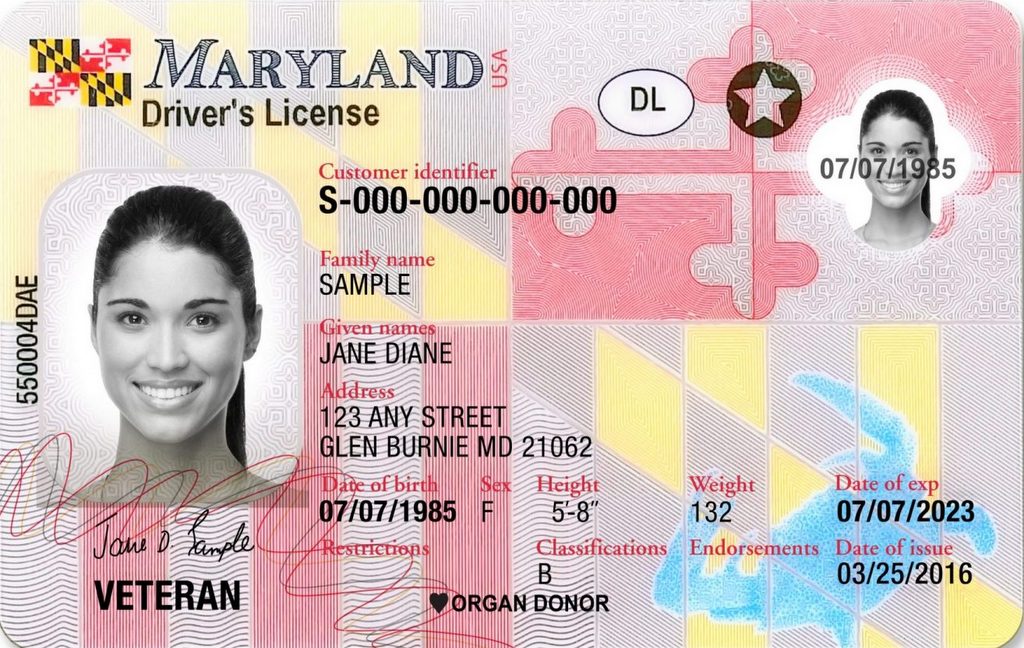[ad_1]
By Jeff Barnes
Capital News Service
Maryland drivers who have their licenses confiscated due to Real ID non-compliance would be protected under legislation heard this week in the General Assembly.
In 2005, the federal Real ID Act mandated that all U.S. residents obtain an updated identification card in order to travel on commercial aircraft and access federal facilities. The rule, which goes into full effect on Oct. 1, requires states to verify documentation that proves name, birth date and residence.

Those found driving with a license that expired for failure to comply with Real ID rules can have that license confiscated by police and may not continue to drive, as Maryland law requires drivers to be in possession of a valid license while driving.
But under these bills, drivers who have their license confiscated by police for Real ID non-compliance would have 90 days to submit necessary documents to the Motor Vehicle Administration.
The bills would exempt drivers during this 90-day period from being charged with failing to possess or display a driver’s license if pulled over for another infraction.
The MVA began issuing the more secure Real ID cards, those with the star in the upper-right corner, in 2016, but did not require the submission of the Department of Homeland Security’s required identification documentation until the beginning of 2018.
About 1.8 million Marylanders, including those who have a license marked with a star but have not yet submitted paperwork, are not yet Real ID compliant, according to data provided to Capital News Service last week by MVA spokesperson Whitney Nichels. Overall, about 61 percent of Marylanders are compliant, well above the 27 percent national average, Nichels wrote in an email.
In December 2018, the MVA began notifying drivers in phases that additional documentation was needed to bring their licenses into compliance, issuing recall notices in advance of the Oct. 1 deadline, when a valid Real ID will be necessary to access federal facilities or board commercial aircraft.
The staggered deadlines were designed to ensure the department could provide “outstanding service” to all customers, Nichels wrote in an email.
In July, law enforcement officials in Maryland began confiscation of those licenses that had been recalled due to non-compliance.
Lawmakers were expected to hear House bill 28 on Jan. 30. The cross-filed Senate bill 173 was heard on Jan. 28.
The House bill’s lead sponsor, Delegate Eric Ebersole, D-Baltimore and Howard counties, told Capital News Service that the process may be confusing for those drivers who have never had to provide the necessary documentation during previous renewals.
“This is an unusual thing for people to have to do,” Ebersole said. “They may not fully understand the whole situation.”
Ebersole said he spoke with several law enforcement agencies and some indicated they would enforce the confiscation of non-compliant licenses while others indicated they would not, fearing an “adversarial” position.
“When you do a traffic stop, you don’t know exactly who you’ve got there,” he said. “They say officers are very, very nervous when doing traffic stops, because they don’t know what person they’re going to be coming up on.”
In a Maryland State Police bulletin provided to Capital News Service, troopers are instructed on how to handle confiscation of recalled licenses. The bulletin reminds officers that possession of a recalled license is not probable cause for a traffic stop and to use “extreme caution” when charging someone for not possessing a driver’s license if that license was confiscated due to non-compliance.
During testimony on Senate bill 173 on Jan. 28, Sen. Katie Fry Hester, D-Carroll and Howard, the lead sponsor, said the legislation would provide clarity for drivers and law enforcement in the coming months.
Sen. Ronald Young, D-Frederick, during Tuesday’s hearing questioned the 90-day grace period for drivers to bring their licenses into compliance after confiscation.
“If I get stopped and they take my license, I’m going to go into a DMV the next day or the next week,” Young said. “I mean, how much do we bend over?”
Sen. Susan Lee, D-Montgomery, said during the Senate hearing she wanted to hear from the MVA to provide clarity on the Real ID process; committee Chair William Smith, D-Montgomery, said they would request information from the agency.
“We need to do something about it, so that some people don’t fall between the cracks,” she said.
In addition to several mailings to affected customers, the MVA has extended hours, opened new annex locations in Columbia and Parkville to help serve customers, and offers more than 28,000 appointments per week, guaranteeing customers will be seen within 15 minutes of their appointment time.
Brian Zimmer, president at Keeping IDentities Safe, a Washington, D.C.-based non-profit that aims to educate the public about the importance of secure identification, said Maryland’s MVA had a “phenomenal” roll-out of the Real ID program, calling the department one of the top five in the country.
Zimmer argued against the idea that Marylanders were still unaware of the new requirements, calling it a “myth.”
“If they don’t know about this, they don’t live where they said they did when they got their Real ID,” he said.
Marylanders can check the status of their Real ID using the MVA’s online look-up tool at http://www.mva.maryland.gov/realid/realidlookup.htm.
*Story has been corrected to reflect that the MVA can accommodate up to 28,000 people per week, not per day.
[ad_2]
Source link

